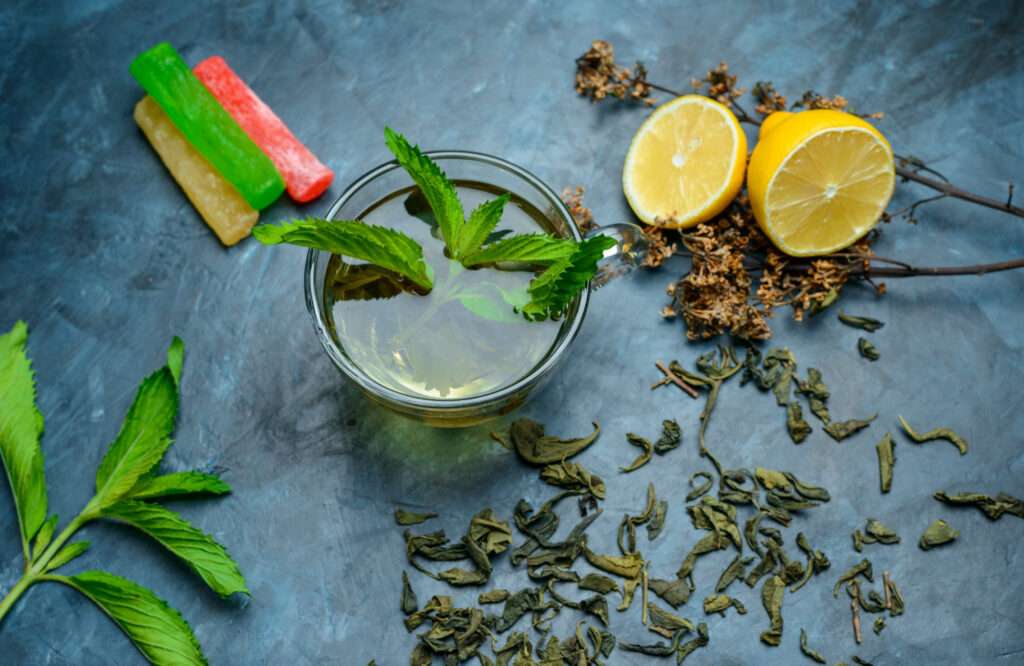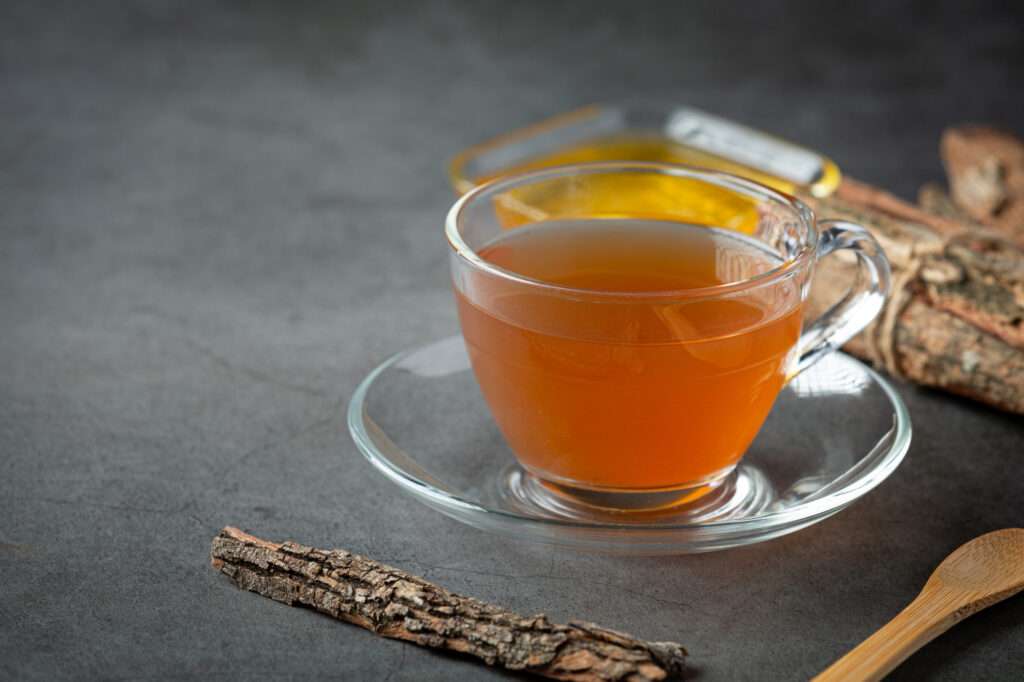Table of Contents
Tulsi, also known as holy basil, has been revered for centuries for its medicinal properties and spiritual significance. In today’s fast-paced world, where stress and health concerns are prevalent, many are turning to natural remedies to enhance their well-being.
One such remedy is Tulsi tea, brewed from the leaves of the holy basil plant. In this introduction, we will explore the reasons why incorporating this into your daily routine can be a transformative step towards holistic wellness. Let’s explore why you should include tulsi tea in your daily routine for better health.

What is Tulsi Tea?
Tulsi tea is a herbal drink made by steeping Tulsi leaves in hot water. It’s not just about sipping a warm beverage; it’s a flavorful infusion with a pleasant taste and a comforting aroma.
Historical and Cultural Significance:
Tulsi has been a part of traditional medicine and spiritual practices for ages. In India, it’s considered a sacred plant, symbolizing purity and positive energy. So, when you sip Tulsi tea, you’re not just enjoying a drink; you’re connecting with a rich cultural heritage.
Key Bioactive Compounds and Health Benefits:
Tulsi is like a treasure chest of goodness. It contains essential oils that give it a lovely smell, flavonoids that act as antioxidants, and ursolic acid known for reducing inflammation. These compounds aren’t just fancy terms—they’re the natural elements in Tulsi that can contribute to your well-being.
So, Tulsi tea is more than a tasty sip—it’s a blend of tradition and potential health benefits. By incorporating Tulsi into your routine, you’re not just embracing a cultural symbol; you’re also inviting the goodness of essential oils, flavonoids, and ursolic acid into your daily life. Let’s explore how these elements in Tulsi tea can make your wellness journey more flavorful and fulfilling.
Why Include Tulsi Tea?
1. Immunity Booster:
Antimicrobial Properties:
- Compounds like eugenol, rosmarinic acid, and apigenin found in Tulsi possess antimicrobial properties, potentially inhibiting the growth of harmful bacteria and viruses.
Antioxidant Activity:
- Flavonoids such as orientin and vicenin present in Tulsi exhibit antioxidant effects, scavenging free radicals and reducing oxidative stress, which can weaken the immune system.
Immune Modulation:
- Studies suggest that Tulsi extracts may modulate immune responses by stimulating the production of immune cells like T lymphocytes and natural killer cells, enhancing the body’s ability to combat infections.
Preventive and Therapeutic Potential:
- Preliminary research indicates that Tulsi extracts or Tulsi tea consumption may help prevent respiratory infections like colds and flu, as well as aid in managing symptoms when already afflicted. However, more rigorous clinical trials are warranted to establish its efficacy definitively.
Incorporating Tulsi tea into your daily routine can be a scientifically supported strategy to bolster your immune defenses, complementing other lifestyle factors essential for optimal immunity.
2. Stress Relief and Improved Sleep:
Adaptogenic Goodness:
- With its adaptogenic powers, it helps keep stress hormones like cortisol in check, making your body better at handling life’s ups and downs.
- Thanks to compounds like ocimarin and eugenol, sipping Tulsi tea can give you a sense of calm, easing away those stress and anxiety vibes.
Good Sleep
- Less stress means your body can chill out more, indirectly paving the way for better sleep quality.
- Tulsi tea helps strike a balance between your mind and body, creating a cozy environment for a good night’s sleep.
Relaxation Tag Team:
- Try sipping Tulsi tea while doing mindfulness meditation for a double dose of relaxation. It’s like a little Zen moment in a cup.
- Pairing it with deep breathing exercises is a simple way to invite a calm atmosphere, making it easier to drift into dreamland.
Unwind with Tulsi tea and these easy relaxation tricks, creating a laid-back routine that supports stress relief, better sleep, and an all-around good vibe.
3. Antioxidant Powerhouse:
Fighting Harmful Stuff:
- Tulsi tea is packed with antioxidants, like flavonoids and essential oils. These antioxidants act like bodyguards, protecting our cells from harmful molecules called free radicals.
Keeping Things Balanced:
- By battling free radicals, Tulsi’s antioxidants help keep our cells healthy and balanced. This balance is crucial for preventing damage and maintaining overall well-being.
- Tulsi’s antioxidants may also help calm inflammation, which is often linked to stress and damage in the body.
Looking Out for the Long Run:
- Long-term stress on our cells, called oxidative stress, can lead to serious health issues like heart disease and cancer. By enjoying it regularly, you’re giving your body a boost in fighting off these potential problems.
Make Tulsi tea part of your daily routine to give your body a natural boost in staying healthy and strong against the challenges of everyday life.
4. Digestive Support:
Gentle on Your Digestive System:
- Tulsi tea offers a gentle touch to your digestive system, potentially alleviating discomfort and fostering digestive well-being.
- Noteworthy for its carminative properties, Tulsi aids in reducing gas and bloating, providing a comforting solution for digestive ease.
Relief for Common Digestive Issues:
- Tulsi tea may be a helpful companion in addressing bloating, offering a natural approach to alleviate this common digestive concern.
- The soothing nature of Tulsi extends to potential relief from cramps, contributing to a more comfortable digestive experience.
- In moments of indigestion, it could be a supportive ally, assisting in easing post-meal discomfort.
Holistic Digestive Wellness:
- While Tulsi tea presents digestive benefits, it’s integral to integrate it into a broader approach to gut health. Incorporate balanced nutrition, hydration, and fiber-rich foods for a comprehensive strategy towards digestive well-being.
Include this in your routine as a thoughtful addition to your digestive health regimen, combining its natural properties with holistic habits for a professionally nurtured gut.
5. Beyond Physical Benefits:
Cultural Reverence:
- Tulsi holds a sacred place in various cultures, symbolizing purity and positive energy. By incorporating this tea, you connect not just with a beverage but with a cultural legacy that spans centuries.
Mindfulness Potential:
- Sipping Tulsi tea can be a mindful ritual, allowing a moment of calm amidst the hustle. The act of enjoying this tea may serve as a simple yet powerful practice in mindfulness.
Savoring the Moment:
- Beyond its potential health benefits, there’s a simple joy in savoring a warm, flavorful cup of Tulsi tea. It’s a pause, a moment for yourself in the midst of the day’s demands.
Holistic Well-Being:
- Incorporating this tea into your routine isn’t just about physical health. It’s about nurturing your mind and spirit, contributing to a sense of holistic well-being. It’s a small but impactful step towards a more balanced and mindful lifestyle.
Elevate your daily routine by embracing Tulsi tea—a bridge between cultural richness, mindfulness, and the simple joy of sipping a cup of goodness for your overall well-being.
Making Your Tulsi Tea
Fresh Tulsi Tea:
Ingredients: Fresh Tulsi leaves (about 6-8), Water (1 cup)
Instructions:
- Rinse the fresh Tulsi leaves.
- Boil water and pour over the leaves.
- Steep for 5-7 minutes for a fragrant and revitalizing cup.

Dried Tulsi Tea:
Ingredients: Dried Tulsi leaves (1 teaspoon), Water (1 cup)
Instructions:
- Place dried Tulsi leaves in a teapot.
- Boil water separately and pour over the leaves.
- Steep for 7-10 minutes for a robust and flavorful infusion.
Enhance the Flavor:
Additions: Experiment with flavor variations by adding a touch of:
Honey: For natural sweetness.
Ginger: Grated or sliced for a hint of warmth.
Lemon: A splash for a refreshing twist.
Stir in: Add these after steeping and stir well.
Ideal Steeping Conditions:
Temperature: Aim for around 200°F (93°C) for the water.
Steeping Time: Adjust based on your preference, but a range of 5-10 minutes is generally suitable for extracting Tulsi’s goodness.
Enjoy the process of creating your Tulsi tea, experimenting with flavors, and finding the perfect balance that suits your taste buds. Whether with fresh or dried leaves, let each cup be a delightful journey into the world of holistic well-being.
Safety and Considerations
Potential Side Effects:
While Tulsi is generally safe for most people, it may interact with certain medications. If you’re taking medications or have any health concerns, consult with your healthcare provider before incorporating Tulsi tea into your routine.
Some individuals may experience allergic reactions to Tulsi. If you have allergies to other plants in the mint family, such as basil or mint, exercise caution when consuming Tulsi tea.
Special Considerations:
If you’re pregnant, breastfeeding, or on specific medications, it’s advisable to consult your healthcare provider before consuming Tulsi tea. While Tulsi is traditionally used during pregnancy and lactation, it’s essential to ensure it’s safe for your individual circumstances.
Conclusion:
In summary, Tulsi tea offers a simple and enjoyable way to potentially experience the benefits of Tulsi. Whether you’re seeking immune support, stress relief, or digestive comfort, Tulsi tea can be a soothing addition to your daily routine. Remember to consult with your healthcare provider, especially if you’re pregnant, breastfeeding, or taking medications, to ensure Tulsi tea is suitable for you. Give it a try and see how it makes you feel—embracing the goodness of Tulsi one sip at a time.

FAQs:
1. What is tulsi tea good for?
Tulsi tea is known for its potential benefits, including immune system support, stress reduction, digestive aid, and antioxidant properties. It may offer a holistic approach to well-being, contributing to overall health and balance.
2. Is it safe to drink Tulsi tea everyday?
In general, Tulsi tea is safe for most people when consumed in moderation. However, it’s advisable to consult with your healthcare provider, especially if you have underlying health conditions, are pregnant, breastfeeding, or taking medications. They can provide personalized guidance based on your individual health profile.
3. What are the side effects of tulsi tea?
While Tulsi tea is well-tolerated by many, some individuals may experience allergic reactions, especially if they have allergies to plants in the mint family. Additionally, it may interact with certain medications. It’s essential to be aware of potential side effects and consult with a healthcare professional if you have concerns.
4. Who should not drink tulsi tea?
Individuals with allergies to plants in the mint family (basil, mint) should exercise caution. Pregnant or breastfeeding individuals, as well as those on specific medications, should consult with a healthcare provider before incorporating Tulsi tea into their routine to ensure its safety for their unique circumstances. Always seek personalized advice to make informed decisions about your health.
